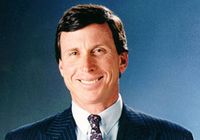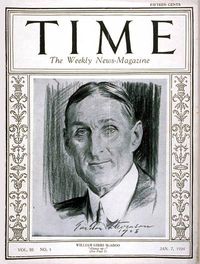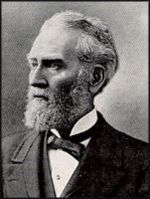Think of this as Volume 15, Number 40 of A-Clue.com, the online newsletter I've written since 1997. Enjoy.

I well remember going to the Atlanta Press Club in 1995 and listening to Cox Enterprises CEO James Cox Kennedy (right), a former newspaperman about my age, spout off about how they were going to win the future by simply “re-purposing” existing content for the new medium. I even got a t-shirt advertising one of his new sites – an entertainment venture called yall.com.
I knew he was wrong, and said so. He never got back to me. Neither did anyone else.

You identify a place, an industry or a lifestyle with unmet needs. You find out what those buyers need to buy, you organize that marketplace, and you advocate for the buyers. The advocacy gains the interest of buyers, but it's the organization of the market that makes the business work. You're where their buyers are, and for buyers you're where they'll find the stuff they want to buy.
Everything else is show. The writing, the reporting, the editing, that's defined by the market, by the needs of buyers in that market, by the need to bring them to the stuff they want to buy.
If you're not doing that you're nothing. Raw numbers won't cut it. It's not how many people read your stuff, but which people. And whether, after reading your stuff, you can help those readers get the goods and services they want and need.

Notice what's happening? You're organizing the marketplace for both sides of the transaction. You're telling the sellers where their buyers are – you're proving that you have their buyers – and you're telling buyers (in your paper) things they want to know. Keep their interest and you have a business. But the heart of the business lies in your making a market for the place you serve.
Same thing with an industry or lifestyle. Remember those little blow-in “qualcards” you used to see inside, say, PC Magazine? They asked for all sorts of stuff – where you worked, what your title was, etc. etc. If the answers showed you were the kind of reader advertisers wanted you got the magazine for free. If not, you had to pay.
This makes perfect sense. The readers the advertisers want to reach are those who will buy their stuff. The qualcard data proves to them that the buyers they want are reading your publication. The rest of the circulation – the readers who don't qualify – that's waste. You may let them buy a copy at a newsstand, but they don't really count. You've organized the market for the sellers, and you keep that market alive by then organizing the market for the buyers as well.

There are two problems with this. Because these are general circulation papers, the Times and Journal are limiting their markets by erecting paywalls. And because the paywalls keep out a lot of people their influence on the culture is less, too – they are both eating their seed corn. I strongly suspect, by the way, that the Journal pay wall is more sophisticated and porous than that of the Times. Which, when you think about the specialized nature of most Journal content (it's about big business first of all) is really quite silly.
Rather than killing themselves in self-righteous bleating that “our content must be paid for” (which is silly – ads have always paid contents' costs) what both papers should have done was erect sophisticated registration systems. Get that qualcard information, and make sure those who are the buyers, the players in your market are not only getting access, but getting extra services. Like a daily email summarizing the paper's contents, with links and maybe a short editorial summarizing the day, by the paper's best writer.
For specialized papers, for industry books sure – put up the wall. Don't let anyone in until they prove they are part of the target market. Don't even take their money. Shut the door. If you're exclusive, and if you have the players in the industry all lined up, then you can charge enormous sums to advertisers. You can become a key conduit for their marketing. You can survey the readers, you can vet the offers in the market, you can send them emails from the sellers they most want to see.

I thank God that Medill, where I went for a year, never sold that. I was told never to call a teacher “doctor,” because they didn't have doctorates. They were hard-boiled, experienced editors and publishers, who told me straight-up that if I wanted to live a good life I'd need a spouse with a good job, that if I didn't truly love doing this I shouldn't try, and that some times I would be be doing it for nothing.
But I do often wish I'd taken that first lecturer's advice, and gone around to the business school. I would have been better prepared to put my insights about this business into this business, to put the things I learned at Medill, into practice.
Because Joe Medill (above, right) wasn't a journalist. Neither was Walter Annenberg, and neither was Joe Pulitzer. They were publishers, they were businessmen, they put buyers and sellers together, they created markets.
Who puts the doh-re-me
In our pockets
Keeps the party going on?
It's the man
Who sells the potions
I'm just one who plays the songs











It isn’t enough to see what’s happening. Kennedy and his kind probably did, but couldn’t adapt their institutions to take advantage of it.
He was running a big corporation with a lot of mouths to feed, and it’s almost impossible to make the cuts before circumstances force them. He also had to answer to shareholders who were hungry for growth, and any realistic adjustment would have involved shrinkage.
Simply put, the easiest path to the necessary adjustment was not for the dinosaurs to adapt, but for new tiny organizations to spring up and start growing.
It isn’t enough to see what’s happening. Kennedy and his kind probably did, but couldn’t adapt their institutions to take advantage of it.
He was running a big corporation with a lot of mouths to feed, and it’s almost impossible to make the cuts before circumstances force them. He also had to answer to shareholders who were hungry for growth, and any realistic adjustment would have involved shrinkage.
Simply put, the easiest path to the necessary adjustment was not for the dinosaurs to adapt, but for new tiny organizations to spring up and start growing.